
Trump Pushes for Nuclear Deal with Iran: What’s Next?
In an unexpected move, former President Donald Trump has urged the Iranian leadership to negotiate a new nuclear deal, claiming, "something's going to happen very soon." This announcement comes as Trump reportedly sent a letter to Iran's Supreme Leader, Ayatollah Ali Khamenei, emphasizing a diplomatic approach rather than military action. His comments signal a shift from the hardline stance that characterized his earlier presidency, which saw the U.S. withdrawal from the Joint Comprehensive Plan of Action (JCPOA) in 2018.
Trumps' Diplomatic Outreach: A Change in Tone
Trump's letter indicates an openness to discussions, advocating that reaching an agreement would be more beneficial for Iran. "If we have to go in militarily, it’s going to be a terrible thing for them," he explained in a recent interview, reiterating his preference for negotiations.
This tone breaks from the preceding maximum pressure policy that aimed to cripple Iran’s economy and restrict its nuclear ambitions through sanctions. Trump stated, "I'm not looking to hurt Iran. They're great people," underscoring his desire for peace over conflict.
Current Iranian Stance: Rejections and Realities
However, Iranian officials have dismissed Trump's correspondence as an unconvincing tactic. Iranian Foreign Minister Abbas Araghchi maintained that Tehran would not engage in talks while experiencing threats and sanctions. His firm stance reveals deep-rooted skepticism about U.S. intentions, stemming from previous diplomatic disappointments under the Obama administration as well as Trump's earlier policies.
Furthermore, as Iran continues to enrich uranium to levels approaching weapons-grade capabilities, skepticism grows over whether diplomatic avenues will be effective, especially without a significant shift in U.S. strategy.
Risk of Military Conflict: The Urgent Call for Peace
Concerns about Iran’s approach to nuclear weapons have alarmed not just the U.S. but also its allies in the Middle East, particularly Israel, which views a nuclear-capable Iran as an existential threat. Trump himself has emphasized the urgency of reaching an agreement, stating, "Can't let them have a nuclear weapon." These worries point towards a perilous situation that could escalate into military conflict if diplomatic efforts fail.
The repercussions of a potential military confrontation would be catastrophic, not only for Iran but also for regional stability including surrounding nations such as Iraq and Saudi Arabia. U.S. sanctions have failed to dismantle Iran's nuclear ambitions, highlighting the need for direct negotiations rather than a hostile approach.
Historic Context: Lessons from the Past
The previous JCPOA agreement, hailed as a diplomatic triumph when established in 2015, lifted economic sanctions in return for restricting Iran’s nuclear ambitions. However, Trump's exit from the deal reversed those gains and reignited tensions. Drawing lessons from history, any diplomatic engagement must be accompanied by trust-building measures to foster genuine dialogue.
A Complex Landscape: Domestic and International Pressures
Trump’s initiative comes amid domestic pressure as well. Politically, any perceived leniency towards Iran could create tensions with Israel, which has conducted airstrikes against Iranian targets repeatedly. While Trump seeks to reposition America’s foreign policy, the prospects for effective negotiations remain reliant on both sides agreeing to set aside adversarial postures.
Future Predictions: What Lies Ahead?
Looking forward, the anticipation of immediate outcomes from Trump's outreach is met with cautious skepticism. Indeed, whether the forthcoming actions translate into meaningful negotiations remains to be seen. The international community is watching closely, as Iran’s nuclear developments could dictate future geopolitical dynamics in the region.
In conclusion, Trump’s renewed interest in negotiating a nuclear deal reflects an awareness of the risks posed by an unchecked Iran, but it is also a reminder of the complexities that define U.S.-Iran relations. Achieving lasting peace requires fresh diplomatic efforts grounded in trust and mutual respect.
If you want to stay updated on significant international developments and their implications, engage with leading national news today.
 Add Element
Add Element  Add Row
Add Row 



Write A Comment